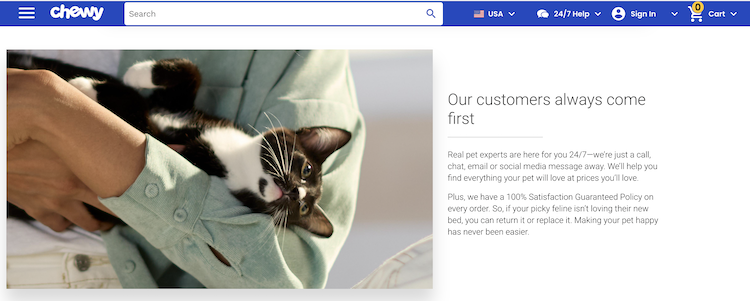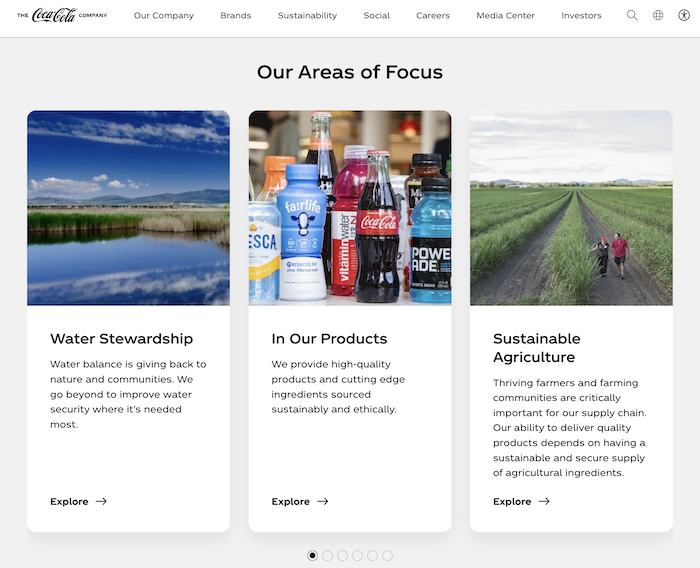In today's competitive marketplace, you'll find that establishing a brand isn't just about products or services; it's about values.
Brand values serve as the guiding principles that define a company's identity, shaping its interactions with customers, employees, and the wider community. These values encapsulate the ethos and beliefs that drive every decision and action, reflecting the brand's commitment to integrity, innovation, sustainability, and beyond.
In this article, we delve into the significance of brand values, exploring how they foster trust, loyalty, and differentiation in an increasingly discerning consumer landscape. We also share some real-life examples of companies and their values and provide helpful guidance on how to develop brand values for your own business!
What are brand values?
Brand values encapsulate the fundamental beliefs and principles that guide a company's behavior, decisions, and interactions. They are the core ideals that define a brand's identity and shape its culture.
Brand values represent what a company stands for, its vision for the future, and its commitment to stakeholders, including customers, employees, and the broader community. These values serve as a compass, influencing everything from product development and marketing strategies to employee engagement and corporate social responsibility initiatives.
Ultimately, brand values are the foundation upon which trust, loyalty, and meaningful connections with consumers are built.
Why are brand values important?
In the current market landscape, shoppers gravitate towards brands that are in line with their own values. In fact, according to Statista, 61% of consumers worldwide tend to purchase from brands that reflect their personal values. Presenting your business in a manner that allows your ideal customers to connect and identify with it is therefore key.
It's imperative for businesses to ensure that their brand values are not just determined but also fully comprehended and upheld, offering clear directives on how to exemplify and embody them in everyday operations. Establishing a reputation for upholding your company's core values can be highly impactful in distinguishing yourself from competitors.
What are the benefits of brand values?
Still not convinced that it's worth taking the time to establish brand values?
Here are some of the top benefits you will be able to look forward to when aligning your brand with values, along with their potential positive effects on your business:
- Attract new customers: Brand values act as a magnet, attracting new customers who resonate with your principles and beliefs. When aligned with the values of your target audience, your brand becomes more appealing, fostering trust, credibility, and emotional connections that compel individuals to choose your business over competitors.
- Increase customer loyalty and trust: Not just a tool for getting new customers, brand values can help keep your current shoppers coming back for more by building customer loyalty and boosting trust. Demonstrating authenticity and consistency in your actions and communications through the creation and application of brand values will aid your customers in developing a deeper emotional connection, leading to sustained trust and loyalty over time.
- Create differentiation and a competitive advantage: In a crowded marketplace, brand values provide a unique point of differentiation. When consumers resonate with a brand's values, whether demonstrated in a product video, "About Us" page, email newsletter, etc., they're more likely to choose that brand over competitors with similar offerings. Well-defined values help brands stand out, attract like-minded customers, and produce a distinct competitive advantage.
- Maintain employee engagement and retention: Do you already have a team of people working for you or plan on having employees in the future? Keep in mind that brand values serve as a guiding force that aligns employees with a common goal and culture. When employees feel a connection to the values upheld by the company and have a sense of purpose, they experience higher job satisfaction, engagement, and a sense of belonging, leading to increased retention and productivity.
- Bolster business operations: Brand values also provide a framework for decision-making and behavior within the company, ensuring consistency and alignment across all aspects of business operations. By integrating your values into processes and policies, they streamline operations, enhance communication, and foster a cohesive and productive work environment.
What are some good examples of brand values?
Although your brand's values should be articulated and implemented in a manner tailored to your specific business needs, here are several common examples of values that can influence operational practices and what each means for your company:
- Integrity: Consistently uphold honesty, transparency, and ethical principles in all actions and interactions, promoting trust and credibility with shoppers.
- Sustainability: Prioritize environmentally-friendly practices, minimize ecological impact, and ensure long-term viability for future generations.
- Innovation: Continuously strive for creative solutions, embrace change, and pioneer new ideas to stay ahead in the market.
- Creativity: Foster an environment that encourages imaginative thinking, innovation, and originality in problem-solving, product development, and marketing strategies.
- Excellence: Consistently deliver high-quality products or services, exceed customer expectations, and always aim for improvement in all aspects of operations.
- Customer-centricity: Make the needs, preferences, and satisfaction of customers your priority in every decision and action, fostering strong relationships and loyalty.
- Authenticity: Maintain consistency between your actions, communications, and core values, supporting genuine connections with stakeholders.
- Diversity and inclusion: Create a workplace culture and environment that respects, values, and celebrates the unique perspectives, backgrounds, and contributions of all individuals.
- Transparency: Openly share information, communicate freely and honestly, and be forthcoming about decisions, policies, and practices.
- Courage: Dare to take calculated risks, challenge the status quo, and fearlessly pursue innovative ideas, even in the face of uncertainty or adversity.
- Leadership: Inspire and empower others, set a positive example, and guide the organization towards its goals with vision, integrity, and resilience.
What are real-life examples of core brand values?
To further help inspire your strategy, here are some real-life examples of companies and their brand values.
Chewy
One of the main operating principles of pet-supply company Chewy is "Customers First." The organization aims to supply an excellent, unforgettable experience for shoppers, providing top-notch customer service available 24/7 and a 100% Satisfaction Guaranteed policy for all orders.

Examples of customer service offered by Chewy
Apple
Tech company Apple has several core values, one of which is accessibility. It puts this into action by offering built-in accessibility features in its products and services, ensuring that people can use them in whatever manner works best for them.

Examples of Apple's speech features that make their offerings more accessible to users
Coca-Cola
Coca-Cola, established in 1892, exemplifies its core value of sustainability by acting in a number of ways to build a more sustainable feature.

Examples of sustainable actions taken by Coca-Cola
How do you create a list of your core brand values?
Brand values are essential for every company's prosperity, yet delineating them can pose a challenge when considering diverse perspectives, priorities, needs, and attitudes.
Here's a step-by-step guide to help you determine your specific core brand values and start implementing them for your business.
1. Reflect on your purpose
Start by asking yourself why your business exists beyond earning a profit. What's the deeper purpose or mission driving your brand?
Consider the impact you aspire to make on your target audience and society as a whole. Explore the core beliefs and principles that drive your passion and guide your decisions.
By aligning your brand's values with your purpose, you can articulate a clear and authentic identity that resonates with both your team and your customers.
2. Gather input
Next, it's advantageous to engage with key stakeholders, including employees, customers, and partners. Conduct surveys, interviews, or focus groups to gather insights on what they perceive as the most important values associated with your brand.
Their perspectives offer valuable insights into how your brand is perceived and what values resonate most. By involving others, you gain diverse perspectives that enrich the value-definition process, ensuring alignment with your audience's expectations. This collaborative approach fosters a sense of ownership and inclusivity, enhancing the authenticity and relevance of your brand values.
3. Analyze your history
Understanding your history helps ensure continuity and consistency in your brand's values, bolstering trust and credibility with your audience.
Look back at your business's history and reflect on past actions, decisions, and achievements to uncover recurring themes and underlying principles. These can serve as clues to your underlying core values.
Identifying pivotal moments that align with certain values will help you gain insight into your organization's authentic identity and legacy. This historical perspective provides a foundation for defining values that are rooted in your organization's ethos and resonate with stakeholders.
4. Examine your company's shortcomings
While it's never fun to think about your weaknesses, doing so is the only way to improve and is a crucial step in determining your brand values.
Examining your company's shortcomings involves candidly assessing areas where you've fallen short of your ideals or failed to meet expectations. By acknowledging these weaknesses, you'll find opportunities for growth and improvement, which in turn can help you identify values that address these pain points, guiding your organization towards greater integrity and accountability.
Embracing your vulnerabilities demonstrates transparency and authenticity, which are key parts of trust-building with your audience. Moreover, addressing shortcomings head-on creates a culture of continuous learning and adaptation, ensuring your brand remains resilient and relevant.
5. Compare with competitors
Analyze your competitors' brand values, messaging, and positioning to understand where you stand out and where you might overlap. Differentiation is crucial in identifying unique core values.
Understanding where competing companies stand and how they are perceived will assist you in carving out a unique space in the market that aligns with your strengths and resonates with your target audience.
With this comparative analysis in hand, you'll be well equipped to craft brand values that set you apart, guaranteeing relevance, competitiveness, and distinctiveness in a marketplace full of similar brands.
6. Prioritize
At this point, you may have come up with a fairly lengthy list of potential values for your brand. However, trying to incorporate them all would likely lead to people getting confused and possibly even viewing your business as less than genuine!
Better instead to select a few core values to focus on so as to boost the likelihood of achieving clarity and consistency in your messaging and actions. Consider which values resonate most deeply with your target audience and match up closely with your company's culture and goals.
7. Test for alignment
Now that you've narrowed down your list of preferred brand values, you'll need to verify that the selected ideas align with your brand's vision, mission, and long-term objectives. They should also resonate with your target audience.
Start by thinking about whether the values are reflected in your day-to-day operations, communication strategies, and processes for making decisions. You can also once again turn to other people and solicit feedback from employees, customers, and other stakeholders to make sure that the chosen values are authentic and resonate with the shoppers you're hoping to reach.
8. Craft your values statement
Crafting a clear and compelling values statement provides a framework for decision-making, behavior, and communication, ensuring alignment with your brand's identity and mission. It will serve as a beacon that guides your organization's actions, fosters unity, and reinforces your commitment to authenticity and integrity.
During this step, you'll want to write a concise statement or list that clearly articulates your brand's core beliefs, guiding principles, and ethical standards in a concise and impactful manner. This statement should be memorable and easily understood by both internal and external stakeholders.
9. Integrate values into operations
Once you've put in the time and effort into determining your brand values, it would be a shame not to put them to good use!
To make them as effective as possible, you'll want to embed your core values into every aspect of your business operations, from hiring practices and employee training to product development and customer interactions. This entails aligning processes, policies, and decisions with your core values, ensuring consistency and authenticity in all endeavors.
By integrating values into your operations, you'll be able to create a cohesive culture, enhance employee engagement, and reinforce your brand's identity.
10. Communicate consistently in your marketing
A key component of implementing brand values successfully is consistent communication. If you say one thing in an Instagram post, for example, and say the complete opposite on your ecommerce site, people are going to have a difficult time understanding what's important to you and deciding if your values match up with their own.
It's therefore essential that you communicate your brand values transparently and consistently across all channels, including marketing materials, website content, social media, and customer service interactions. Reinforcing your values at every opportunity to build trust, credibility, and loyalty with your audience is a must!
11. Revisit and revise
In an ever-changing world, you can't expect to do a bit of brainstorming, set your brand values, and never examine them again. Just like your strategy for social media, content marketing, and other growth levers, revisiting and revising brand values is essential to ensure that they remain relevant, authentic, and aligned with your evolving business landscape and customer needs.
As your company grows and changes, so too may the external factors influencing your brand. Regular review allows you to adapt to shifting market dynamics, cultural trends, and internal priorities, maintaining the integrity and effectiveness of your values in guiding making decisions and building strong connections with your target market.
Brand values: Great for companies all around the world!
As you can see, brand values aren't just a set of principles; they're the heartbeat of a company, pulsating through every aspect of its existence. Embracing and embodying these values isn't merely a strategic move but a commitment to authenticity, integrity, and lasting relationships.
By prioritizing values, brands and companies can forge deeper connections with consumers, differentiate themselves in competitive markets, and navigate challenges with clarity and purpose. As your organization navigates an ever-evolving business landscape, you can consider brand values as a kind of North Star, guiding you towards a future where purpose-driven businesses thrive, leaving an indelible mark on both industries and societies.


![Brand values: Definition, examples, and how to determine them [2026]](https://wizishop.com/media/66389d5023d5f34107f36f98/v1/brand-values-wizishop.jpg)







